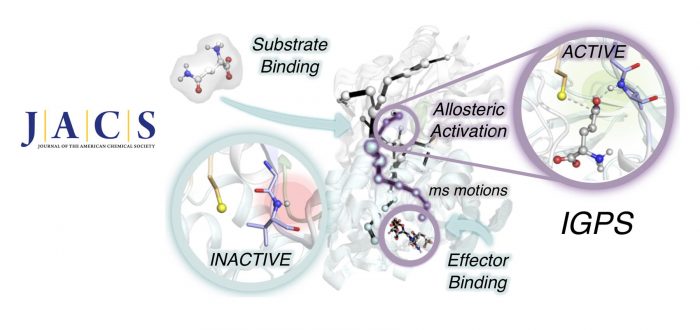Between March 25 and April 1 took place the BioExcel School on Biomolecular Simulations, which included a poster session. Helena Girame, PhD student under the supervision of Dr. Marc Garcia-Borràs and Dr. Ferran Feixas, presented a poster titled “How the Assignment of Protonation States in Distal Residues May Alter Protein-Ligand Binding in Molecular Dynamics Simulations”. Helena’s poster
- sec.iqcc@udg.edu
- +34 972 41 83 57
Month: April 2022
On March 1st, 2022, Dr. Ferran Feixas started a new position at the Department of Chemistry, University of Girona, as a Ramón y Cajal (RyC) Fellow. The Ramón y Cajal Fellowship program is co-financed by the European Commission’s European Social Fund through the Spanish Ministry of Science and Innovation. These grants are aimed at promoting the
Proteins reshape their function in response to environmental changes through allosteric regulation. Allostery is the process in which two distinct sites within a protein or protein complex are functionally coupled. In allosterically regulated enzymes, the binding of a molecule (allosteric effector) at a distal site alters the thermodynamic and/or kinetic parameters of the catalytic reaction
Dr. García-Rodeja has recently become a new member of the Institute of Computational Chemistry and Catalysis (IQCC) as a María Zambrano Fellow. Dr. García-Rodeja received his PhD in Chemistry from Complutense University of Madrid in 2018. During his PhD, he worked with Prof. Israel Fernández on understanding the reactivity of polycyclic aromatic hydrocarbons and related
Tetraphenylethylene (TPE) is the most prominent representative of the aggregation-induced emission (AIE) class of molecules, a family of compounds that has intense fluorescence in the aggregate state. AIEgens have found applications in biosensing, cell imaging or luminescent materials. This work investigates how the emission color of TPE depends on through-space interactions between the phenyl substituents
The C(sp3)–H bond oxygenation of the cyclopropane-containing mechanistic probes 6-tert-butylspiro[2.5]octane and spiro[2.5]octane with hydrogen peroxide catalyzed by manganese complexes bearing aminopyridine tetradentate ligands has been studied. Mixtures of unrearranged and rearranged oxygenation products (alcohols, ketones, and esters) are obtained, suggesting the involvement of cationic intermediates and the contribution of different pathways following the initial hydrogen
Last Thursday took place the Spring edition of the IQCC Forum, a quarterly meeting-place where high-quality science is discussed. The IQCC Forum gives the opportunity for PhD and postdoc members of the IQCC to present their work to a select group of critical researchers, enhancing intra-IQCC collaborations and promoting knowledge exchange within the institute. This
Dr. Kennington has recently become a new member of the Institute of Computational Chemistry and Catalysis (IQCC) as a Margarita Salas Fellow. Dr. Kennington received his PhD in Chemistry from University of Barcelona in 2020. During his PhD, he worked with Prof. Fèlix Urpí and Prof. Pedro Romea on the development of new, direct and








